BOURSE SECURITIES LIMITED
11th February 2019
FIRST, RFHL improve earnings
This week, we at Bourse review the financial performance of two commercial banks listed on the Trinidad and Tobago Stock Exchange (TTCI) for the first quarter ended 31st December 2018, First Citizens Bank Limited (FIRST) and Republic Financial Holdings Limited (RFHL). Both banks reported positive earnings growth, supported by different factors. We discuss the performance of both companies and provide a brief outlook.
First Citizens Bank Limited (FIRST)
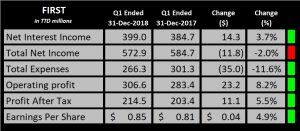
For the first quarter (Q1 2019) ended 31 December 2018, FIRST reported a 4.9% year-on-year increase in Earnings per Share (EPS) from $0.81 to $0.85.
Net Interest Income increased moderately (3.7%), from $384.7M in Q1 2018 to $399.0M in Q1 2019 on the back of higher contributions from Retail and Corporate Banking, which added an incremental $170.8M. On the other hand, contributions from Other Income fell 13.04% to $173.9M. As a result, Total Net Income amounted to $572.9M, 2.02% lower than the $584.7M reported in Q1 2018. During Q1 2019, FIRST benefitted from a reversal in expected credit losses booked in September 2018. Total Expenses were 11.6% lower at $266.3M compared to Q1 2018. Resultantly, Net Profit before Taxation grew to $311.5M, 7.9% higher than $288.8M generated over the comparable period last year. The Group’s effective tax rate increased moderately from 29.6% to 31.1%. Overall, FIRST reported 5.5% growth in Net Profit after Taxation for Q1 2019 from $203.4M to $214.5M.
Outlook
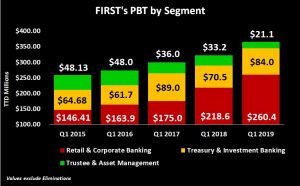
Consistent with performance over the past four years, FIRST has been able to improve Profit before Taxation in the Retail & Corporate Banking segment. Contributions from this business segment added an incremental $41.8M to the group’s PBT in the first quarter. According to the Chairman’s report, the group recorded a 10.3% or $1.7B uptick in consumer loans. Going forward, the increase in the group’s loan portfolio coupled with a higher prime lending rate – which increased from 9.25% to 9.50% in October 2018 (as per the Central Bank of Trinidad and Tobago data on FIRST prime lending rates) – should support interest income in 2019. PBT contributions from the Treasury & Investment Banking segment also improved 19.1%, following a fairly weak performance in the first quarter of 2018. The Trustee and Asset Management segment, however, experienced a 36.4% decline in PBT. While FIRST continues to record growth within its main operating segments, continued weak economic activity in the Trinidad and Tobago and Barbados market could weigh on the Group’s performance in the short term.
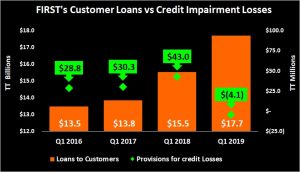
Over the three-year period (Q1 2016 to Q1 2018) the increase in Provisions for Credit Losses has remained relatively in line with growth in Loans to Customers. However, in Q1 2019, while Loans to customers rose 14.2%, the Group reported a credit reversal in Provisions for Credit Losses, which resulted in credit gain net of recoveries of $4.1M compared to a loss of $43.0M a year ago. Despite this one-off gain, provision for credit losses could continue to increase in weak economic conditions. Going forward, the Group’s profitability would depend on the ability to continue to drive growth in both the loan and investment portfolios. Of greater importance would the group’s ability to manage expenses.
Shareholders’ Equity remained relatively consistent at $6.8B. This reflected a 7.7% growth in Assets offset by a 9.2% jump in Total Liabilities. While Loans to Consumers drove Total Assets higher, Total Liabilities rose with a $1.4B increase in Debt Securities in issue.
The Bourse View
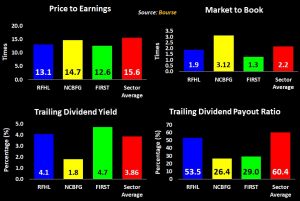
At a current price of $33.96, FIRST trades a trailing P/E of 12.5 times, below the Banking sector average of 15.6 times and its 3-year average of 13.5 times. FIRST offers investors a trailing dividend 4.7%, above the sector average of 3.9%. On the basis of relatively attractive valuations and dividend yield, but tempered by a subdued economic environment, Bourse maintains a NEUTRAL rating on FIRST.
Republic Financial Holdings Limited (RFHL)
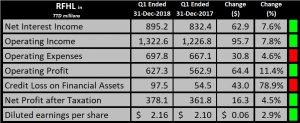
Republic Financial Holdings Limited (RFHL) reported Earnings per Share (EPS) of $2.16 for the first quarter (Q1 2019) ended 31 December 2018, 2.9% higher than the EPS of $2.10 earned in Q1 2018.
RFHL’s Net interest income grew 7.6% year- on- year, from $832.4M to $895.2M. Other income also improved 8.3% ($32.8M) over the period. Resultantly, Operating Income was 7.8% higher at $1.3B compared to $1.2B generated a year ago. Despite a 4.6% increase in Operating Expenses, RFHL was able to generate $627.3M in Operating Profit, 11.4% above Q1 2018’s value of $562.9M. This was offset to some extent by a sharp (78.9%) increase in Credit Loss on Financial Assets, which amounted to $97.5M compared to $54.5M reported over the comparable period last year. Notwithstanding, Profit after Taxation (PAT) improved 4.5%, from $361.8M to $378.1M. Profit attributable to equity holders of the parent also increased 3.1% from $339.9M to $350.5M in Q1 2019.
Outlook
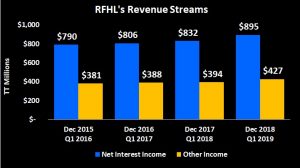
Over the past four years (Dec 2015 to Dec 2018), RFHL has been able to consistently improve income across its revenue streams. For the first quarter of 2019, Net Interest Income contributed an additional $63.0M or 7.6%, while Other Income contributed $33.0M or 8.4%. Going forward, the Group could continue to experience growth in Net Interest Income on the back of a higher lending rate of 9.75% compared to 9.50% a year ago (as per the Central Bank of Trinidad and Tobago data on RFHL’s prime lending rates).
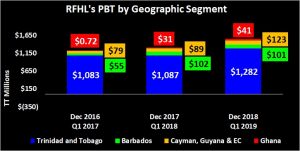
With the exception of the Barbados operations, RFHL has experienced consistent growth in Profit before Tax (PBT) contributions from all its operating locations over the past three years. In Q1 2019, the Trinidad and Tobago operations had the largest impact on PBT, contributing an additional $194.7M. The Group also benefitted from higher PBT contributions from its overseas operations, mainly driven by the performance of the Guyana segment, up 56.5%.
Looking ahead, the Group could continue to experience improved profitability, supported by the acquisition of Cayman National Bank, which (According to the Managing Director of RFHL) could add as much as $0.50 per share to EPS, if the transaction is successful. Additionally, the potential acquisition of nine of Scotiabank’s banking operations would likely strengthen the Group’s regional foothold and potentially bolster further growth in overseas operations. According to the Chairman’s Comments, “the CNC acquisition is at an advanced stage of the regulatory approval process and the process for the Scotiabank transaction has recently commenced”.
RFHL reported a 7.5% increase in Total Equity from $9.3B in Q1 2018 to $10.0B in Q1 2019. This was reflective of a 4.7% or $3.3B growth in Total Assets and a 4.3% or $2.6B growth in Total Liabilities. The increase in Total Assets was mainly driven by improvements in Investment Securities, which grew 33.2% or $3.4B year-on-year. Meanwhile, higher Customer Deposits and Other Funding Instruments supported the increase in Total Liabilities. The Group also reported a significant (73.4% or $811.1M) decline in Debt Securities Issue.
The Bourse View
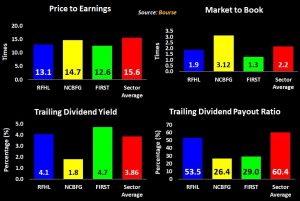
At a current price of $107.53, RFHL trades at a trailing P/E of 13.08 times, below the Banking sector average of 15.6 times and offers a trailing dividend yield of 4.1% above the Banking sector dividend yield of 3.9%. On the basis of continued earnings growth and an attractive dividend yield, Bourse maintains a BUY rating on RFHL.
For more information on these and other investment themes, please contact Bourse Securities Limited, at 226-8773 or email us at invest@boursefinancial.com.
“This document has been prepared by Bourse Securities Limited, (“Bourse”), for information purposes only. The production of this publication is not to in any way establish an offer or solicit for the subscription, purchase or sale of any of the securities stated herein to US persons or to contradict any laws of jurisdictions which would interpret our research to be an offer. Any trade in securities recommended herein is done subject to the fact that Bourse, its subsidiaries and/or affiliates have or may have specific or potential conflicts of interest in respect of the security or the issuer of the security, including those arising from (i) trading or dealing in certain securities and acting as an investment advisor; (ii) holding of securities of the issuer as beneficial owner; (iii) having benefitted, benefitting or to benefit from compensation arrangements; (iv) acting as underwriter in any distribution of securities of the issuer in the three years immediately preceding this document; or (v) having direct or indirect financial or other interest in the security or the issuer of the security. Investors are advised accordingly. Neither Bourse nor any of its subsidiaries, affiliates directors, officers, employees, representatives or agents, accepts any liability whatsoever for any direct, indirect or consequential losses arising from the use of this document or its contents or reliance on the information contained herein. Bourse does not guarantee the accuracy or completeness of the information in this document, which may have been obtained from or is based upon trade and statistical services or other third party sources. The information in this document is not intended to predict actual results and no assurances are given with respect thereto.”
